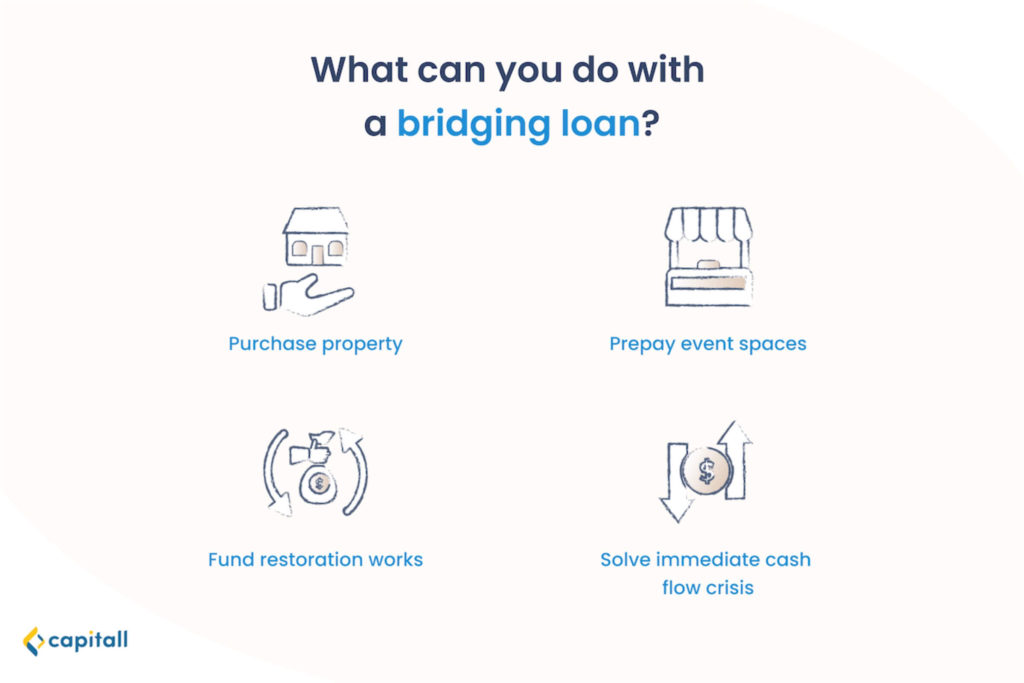

Business loan In Singapore: What Is A Bridging Loan And How Can It Help My Business?

What Is A Bridging Loan?
A bridging loan is designed to help companies and individuals tide over a short period of financial challenge.
For companies, this is a type of business loan that can be used to increase working capital while waiting for longer-term financing to come in.
To individuals, a bridging loan usually applies in the purchase of a new property. The loan can be used to settle downpayment of the new property, while waiting for proceeds from the sale of the current house.
Usually pegged with a 12-month repayment period, a bridging loan is thus a short-term financing option for both companies and individuals.
It is a temporary solution to help companies meet liquidity requirements before funds from a longer-term financing becomes available. Funds from a bridging loan can be used for immediate needs such as the securing of a property, paying vendors and suppliers, or settling operational costs.
The bottom line is that a bridging loan is an interim solution for companies to bridge that gap between fulfilling current obligations and acquiring the needed funds which is not yet available.
It is a form of short-term financing that you might want to consider if you are in urgent need of funds.
Types Of Bridging Loans In Singapore
There are basically 2 types of bridging loans available in Singapore.
Closed Bridging Loan
A closed bridging loan is where both the lender and the borrower set a predetermined date when repayment should be made. You will usually be given a period of up to 12 months to make a full repayment of the business loan amount.
These business loans come with a relatively low interest rate in relation to an open bridging loan. Though it may seem attractive, a snag is that severe penalties would be imposed if you break the terms of the loan agreement.
Open Bridging Loan
Unlike the closed bridging loan, an open bridging loan does not come with a designated exit or repayment date. It allows you to make payment on the loan whenever funds become available to you. You will not be tied down by a fixed repayment date.
This type of business loan is a type of unsecured loan. As such, an open bridging loan usually comes with a higher interest rate.
This type of loan appeals to borrowers who are unsure of the availability of their future finances. However, take note that lenders may deduct the loan interest from the loan advance, as a measure of securing the funds disbursed to the borrower.
In most cases, a closed bridging loan is the business loan of choice for borrowers owing to its relatively low interest rate.
As a bridging loan is usually secured as an interim measure, companies would be more comfortable getting a closed bridging loan. This is because they want to pay it off as soon as funds from their longer-term financing becomes available.
How Can A Bridging Loan Help Your Business?
Despite the short-term nature of a bridging loan, it offers several uses that could be a boon to any business.

1. Solve Immediate Cash Flow Crises In Your Company
Expenses stemming from unforeseen circumstances could happen when you least expected it. For instance, your equipment or machinery might stop working suddenly.
While your business operation must go on, you might not have accounted for a replacement of machinery into your business expenses. A business bridging loan could get you through such an unexpected situation.
Additionally, new businesses in particular have teething problems at the beginning. While waiting for longer-term financing, your business might encounter difficulties with essential expenses like rental, utility bills, or making payments to vendors. Funds from a bridging loan could help maintain fluidity in your business’ cash flow.
2. Moving Offices Or Storage Relocation
As your business grows, you might need to move it to another location. Moving your business can be challenging especially when you don’t have sufficient funds for a downpayment on a new premise.
Getting a bridging loan enables you to continue running your business without worrying about the company’s finances even when you are in the midst of relocating.
3. Running Low On Finances
No matter how well you might have budgeted for your business expenses, your company might run low on finances at some point in time.
With the relatively fast approval for a bridging loan, you could ensure that your business gets the funds it needs fast and avoid any financial setback.
4. Purchase Property Such As Warehouse
As your business expands, you might also find yourself needing more storage space.
Purchasing a storage warehouse or new office space could be in the pipeline, but might not be feasible due to lack of funds.
In such circumstances, it’s wise to approach a private financial institution that can offer a suitable bridging loan that enables you to meet your business expansion needs.
5. Eases Cost Of Restoration Works
Refurbishment of your business’ premises may not always be in the cards. But you have clients and customers to impress, and a shoddy space is not going to cut it.
Securing a business bridging loan could help with renovation or restoration works, which could be a breath of fresh air to an otherwise run-down, unappealing space.
As the saying goes, “first impression lasts”. A newly refurbished, inviting business environment could see your business streaming with more clients and customers.
6. Pre-pay Event Spaces
To generate more revenue, you need to get your products or services out into a wider market. Promotional campaigns to market your products or services become a necessity. That’s why when opportunities such as roadshow events arise, you should seize it.
You’ll need to rent the space to market your product or services, and extra funds may not always be available within the company for this purpose.
A bridging loan can be used to secure a strategic venue to market your products or services. With the extra funds, you may also be able to get part-time hires to help in these events.
Does A Bridging Loan Fit Your Business?
Bridging loan is a viable option for businesses which are in immediate need of funds. As with any loan, it has its advantages and drawbacks. To help you decide if a bridging loan suits your business’ needs, let’s weigh out the pros and cons.
| Pros | Cons |
| Easy, fast approval, usually without checks on credit history | Some form of collateral is required |
| Funding available within days | Only short-term funding of up to 12 months is provided |
| Flexible and can be tailored to your needs | Not suitable for long-term business needs |
| Full repayment can be made at the end of the loan tenure | Interest is usually imposed on a month to month basis and could add up if your project stretches longer than the intended duration |

Unlike bank loans, preparing extensive accounting documents is not necessary when borrowing from private financiers. For example, private financial institution Capitall only requires you to submit key documents. This flexibility, coupled with its fast approval process would mean that you can secure the funds you need within 24 hours.
A bridging loan’s interest rates may be higher than that for other types of business loans due to its short tenure of up to 12 months. So do take some time to find a suitable lender who is willing to listen and understand your business operations so that the loan can be customised towards your company’s needs.

































































































